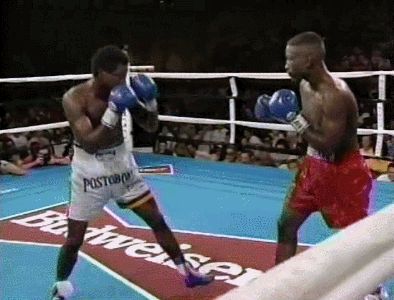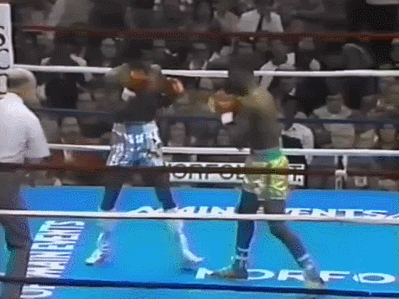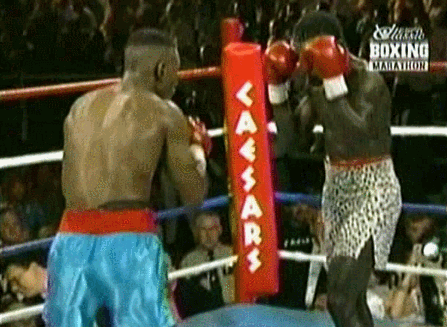Mayweather turned 17 a month after Randall's win over Chavez. He'd been essentially living on his own for a while, particularly after his father was imprisoned for selling drugs the previous year.
Randall had heard about Mayweather – pretty much anyone in professional boxing had, and nearly all of them thought he was a cinch to win a gold medal at the 1996 Olympics in Atlanta – and so he invited Mayweather to train with him.
Soon, Randall and Mayweather became fast friends, living together in Randall's home on a golf course. It was Randall who gave Mayweather the taste for the finer things in life that he now so enjoys.
"He was the first guy to buy me Versace shades," Mayweather said.
When Mayweather walked into the ring the first time to spar Randall, he was shocked. He could hit Randall pretty much at will, but Randall was unable to hit him.
That presented the teenager with a quandary: Did he fight hard, and essentially embarrass the newly crowned champion, or did he take it a bit easy so that Randall would keep him around?
"I boxed him light," Mayweather said. "I didn't box him hard. We hung out and I wanted to keep our friendship. … I wanted to remain friends."
Shelly Finkel, one of the sport's leading managers for more than two decades, was at his peak at the time and had a stable of elite fighters led by superstars Evander Holyfield and Pernell Whitaker.
Finkel, like most top managers, was desperate to get Mayweather signed to a contract when he turned pro, which was expected to be after the Atlanta Olympics. So, Finkel would send money to Mayweather to help him with his expenses and, in essence, try to remain in his good graces.
Finkel brought Mayweather to Norfolk, Va., to train with Whitaker, whom many at the time believed was the best fighter in the world.
"Way, way back, long before the Olympics, anybody who knew boxing knew he'd be a star," Finkel, now a concert promoter, said of Mayweather. "He was the guy. You knew he was going to do big things. He was brought up in a boxing family and he was so dedicated to the sport.
"There's so much hype around him now for things outside of the ring; the money and the cars and the flashiness and what not. But the truth of the matter is, the reason he's successful is that he trains his [expletive] off. I don't know if there is anybody in the game who works harder, and he was that way even back then when he was a kid."
Mayweather was one of several amateurs, along with Zahir Raheem and Zab Judah, who went to Norfolk to train with Whitaker in 1994.
Mayweather wouldn't say much about how the sparring went.
"I've got respect for champions," he said. "It was good work for both of us. That's all I'll say."
Ronnie Shields, now one of the sport's best trainers, was an assistant trainer under George Benton at the time working with Whitaker. He was there to see Whitaker and Mayweather spar. And while he said Whitaker had few problems with the 17-year-old prodigy, it was obvious that Mayweather was destined to be a superstar.
"Pernell handled him, like he handled all of those guys," Shields said. "He wasn't hitting them hard, just playing with them, going down low like he did and fighting with his hands at his side. They couldn't hit him. But remember, Pernell was the best in the world at the time. When Mayweather was in there, even though he was having trouble with Pernell, it was obvious how good the kid was.
"Pernell is a guy who doesn't give out a lot of compliments. He didn't want to say anything about another fighter, because he didn't like the idea of anyone upstaging him. But I remember him saying to me, 'Man, this kid is good right now.' He said to Floyd, 'You stay with this and you remain dedicated, ain't nobody going to touch you.' "






